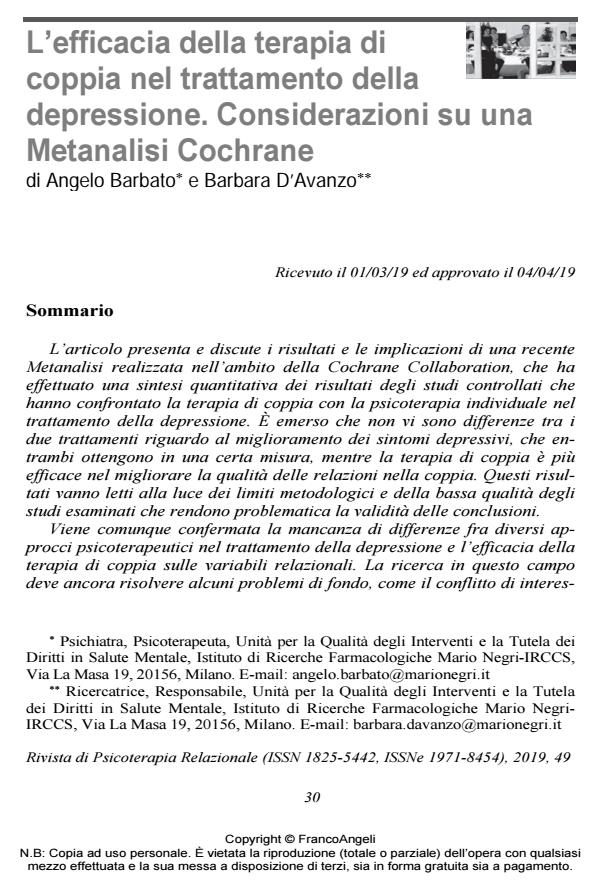Efficacy of couple therapy as a treatment for depression. Remarks on a Cochrane Meta-analysis
Journal title RIVISTA DI PSICOTERAPIA RELAZIONALE
Author/s Angelo Barbato, Barbara D’Avanzo
Publishing Year 2019 Issue 2019/49 Language Italian
Pages 15 P. 30-44 File size 223 KB
DOI 10.3280/PR2019-049002
DOI is like a bar code for intellectual property: to have more infomation
click here
Below, you can see the article first page
If you want to buy this article in PDF format, you can do it, following the instructions to buy download credits

FrancoAngeli is member of Publishers International Linking Association, Inc (PILA), a not-for-profit association which run the CrossRef service enabling links to and from online scholarly content.
This paper presents and discuss the results and the implications of a recent Meta-analysis realized within the framework of the Cochrane Collaboration, aimed at providing a quantitative synthesis of the find-ings of the controlled studies confronting couple therapy with individ-ual psychotherapy as treatment for depression. Both treatments im-proved to some extent the depressive symptoms, without differences between treatments. However, couple therapy was more effective in improving the relationship quality in couples. The methodological lim-its and the low quality of studies prevent to draw firm conclusions from the results. The lack of differences between various therapeutic approaches for depression is confirmed, as well as the efficacy of couple therapy on relational variables. Research in this field must solve some basic prob-lems, such as the conflict of interests and the representativeness of study samples in relation to the clinical practice.
Keywords: Couple therapy, depression, controlled clinical studies, Meta-analysis.
- Bettelheim B. (2013). Il mondo incantato. Milano: Feltrinelli.
- Brodzinsky D., Schechter M. (1990). The Psychology of Adoption. New York: Oxford University Press.
- Arrigoni L. (2013). L’alienazione genitoriale: le dinamiche relazionali. Terapia Familiare, 102: 35-58. DOI: 10.3280/TF2013-10200
- Arrigoni L. (2015). Separazione e perdita dei legami familiari. Minori e Giustizia, 3: 151-155. DOI: 10.3280/MG2015-00301
- Van Cutsem C. (1998). Le famiglie ricomposte. Milano: Raffaello Cortina.
- Russell G., Barclay L., Edgecombe G., Donovan J., Habib G., Callaghan H., Pawson Q. (1999). Fitting Fathers into Families. Canberra: Australian Federal Department of Family & Community Services.
- Omer H. (2016). La nuova autorità. Famiglia, scuola, comunità. Milano: Edi.Ermes.
- Neuburger R. (2004). Nouveaux couples. Parigi: Odile Jacob.
- Mazzoni S.M. (2002). Nuove costellazioni familiari. Le famiglie ricomposte. Milano: Giuffrè.
- Hetherington E.M., Stanley-Hagan M. (2002). Parenting in divorced and remarried families. In Bornstein M.H. (ed.), Handbook of parenting: Being and becoming a parent, pp. 287-315. Mahwah, New York.: Lawrence Erlbaum Associates Publishers.
- Hennon C.B., Hildenbrand B., Schedle A. (2008). Stepfamilies and Children. In Gullotta T.P., Blau G.M. (eds.), Family Influences on Childhood Behavior and Development. Evidence-Based Prevention and Treatment Approaches, pp. 161-185. New York: Routledge, Taylor & Francis Group.
- Guida M.A. (2006). I figli dei genitori separati. Ricerca e contributi sull’affida mento e la conflittualità. Milano: Franco Angeli.
- Du Maurier D. (1938). La prima moglie (Rebecca). Milano: Arnoldo Mondadori.
- Dotti Sani G.M., Treas J. (2016). Educational Gradients in Parents’ Child Care Time Across Countries, 1965-2012. Journal of Marriage and Family, 78: 1083-1096.
- Cyrulnik B. (1989). Sous le signe du lien. Parigi: Hachette.
- Cirillo S., Selvini M., Sorrentino A.M. (2016). Entrare in terapia. Le sette porte della terapia sistemica. Milano: Raffaello Cortina.
- Cigoli V. (2002). Incontrare famiglie ricomposte: alla ricerca di indicatori clinici. In Mazzoni S., a cura di, Nuove costellazioni familiari. Le famiglie ricomposte, pp. 239- 257. Milano: Giuffrè.
- Browning S. (1994). Treating stepfamilies: Putting family therapy into perspective. In Pasley K., Ihinger-Tallman M. (eds.), Remarriage & Steparenting: Current research and theory, pp. 94-104. New York, N.Y.: Guilford Press.
- Accordini M. (2017). La specificità della famiglia ricomposta. In Vetere M., a cura di, La sfida delle Famiglie ricomposte. Un modello di intervento clinico, pp. 15-34. Roma: Alpes Italia.
Angelo Barbato, Barbara D’Avanzo, L’efficacia della terapia di coppia nel trattamento della depressione. Considerazioni su una Metanalisi Cochrane in "RIVISTA DI PSICOTERAPIA RELAZIONALE " 49/2019, pp 30-44, DOI: 10.3280/PR2019-049002